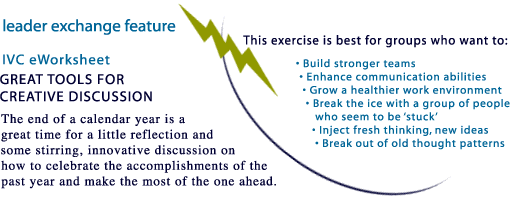 |
 |
| The science and art of Dialogue and Dialectic Thinking can seem abstract and difficult to know how and when to apply, without having real exposure to and experience with the method of communication. So we’ve developed this worksheet to help you and your colleagues take the Dialogue or Dialectic discussion methods for a spin.
What have you got to lose? Time? What have you got to gain? Fresh energy and focus, exposure to a new discussion tool, and maybe a few great new ideas to put into action in the year ahead. A Quick Intro to Dialogue & Dialectical Thinking Dialogue is a process by which conversation happens, assumptions and judgements are exposed, perceptual filters are revealed, real listening occurs and true communication is finally able to emerge. A formal Dialogue process is often used to foster an expanded understanding between people who disagree, sometimes adamantly and often emotionally. Dialogue relies upon good meeting facilitation, skillful listening and, as anyone who's participated in a Dialogue session can tell you, a willingness to move through discomfort around disagreement and potential conflict. The best Dialogue occurs when a participant is open to changing his or her mind based on what she learns from the opinions and beliefs of other participants. Dialogue is not about forging agreement or consensus, which can be tough for people who like to get right to a clean resolution. Again, it's about increasing respectful awareness and understanding. A benefit of applying Dialogue in the workplace is that it can help uncover issues that derail the collaboration, creativity and satisfaction that yield productivity. Dialectical Thinking is certainly complementary, and perhaps even overlapping, with Dialogue. To think dialectically means that the participant is actively exploring more than one opinion or perspective. A terrific definition comes from The Critical Thinking Foundation: "When thinking dialectically, reasoners pit two or more opposing points of view in competition with each other, developing each by providing support, raising objections, countering those objections, raising further objections, and so on." One key benefit of applying a dialectical thinking approach to workplace or planning issues is that 1) the participant is forced to identify opposing options, and 2) the discussion helps to yield a strong, informed perspective that stands up to criticism. Taking a dialectical approach helps sift mere opinion from those perspectives generated from clear thinking. Here are a few practical tools to help you learn a little bit about and integrate these approaches into your own work: Cool Tool #1: A Dialogic Exercise for Your Next Discussion Cool Tool #2: A Dialetic Thinking Exercise for Your Next Discussion |
| There's more to Dialogue than meets the eye
Become a more effective listener |
Brain Food Cafeteria
What else would you like to see us cover? What are your key communication issues or experiences as an organizational leader? |